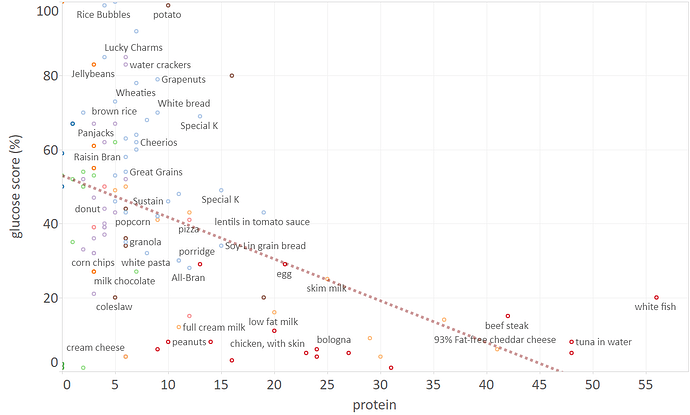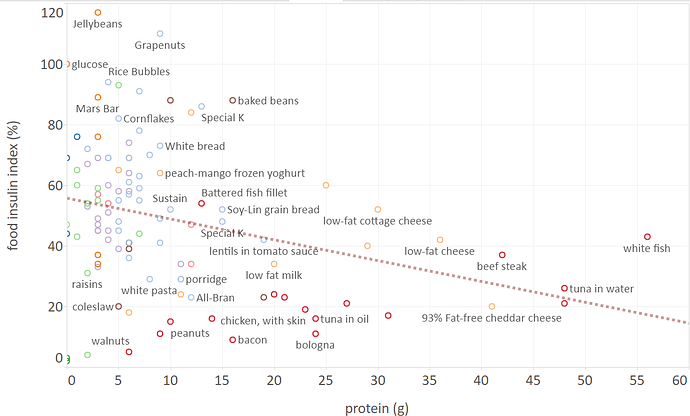I haven’t tried it yet but I’m told it’s really not hard to make your own. At least you would know what’s in it and how fresh it really is.
Insulin index more important than eating LCHF?
I think the Food Insulin Index data is immensely useful as it compares the insulin response of that food to pure glucose.
I don’t see the need for and OGTT to understand the metabolic state of the person doing the test given that it’s calibrated with glucose in vitro.
I think the reason Jennie BM hasn’t promoted it more is because the obvious conclusion is that people with diabetes should eat less carbs!
It’s also immensely useful to understand how people with type 1 can more accurately dose for protein.
The Food insulin Index data indicates that we require about a quarter as much insulin for fructose as carbs. Fructose is metabolized directly in the liver but some is turned to glucose via GNG.
The low insulin response doesn’t necessarily make fructose, especially when it’s separated from nutrients.
The Food Insulin Index testing domonstrates that higher fat fooods trigger a lower insulin response. I think the fact that the implications (i.e. High fat will help stabilise blood sugar and insulin) might be he reason that they haven’t promoted it the way that they have GI.
If you’re interested, you can check out the interactive Tabluea versions of these charts here.
Understanding the insulin response to protein, fiber, carbs and fructose enables us to identify the foods that require the smallest amount of insulin.
![]()
Q: What about “Normal Cheddar Cheese” ?
Q: Can you do a more keto friendly chart ?
- include low carb veggies
- set parameters … Max Insulin index of 25, Max Carbs 30 ?
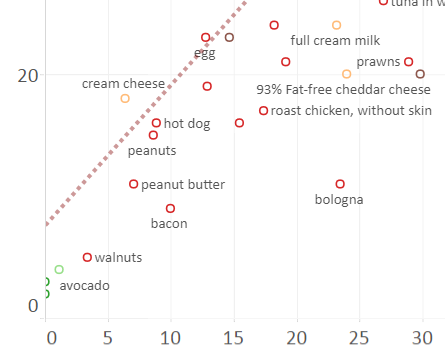
Q: Can you do a ultra low chart too ? Man insulin at avocado level, max carbs say 3 ?
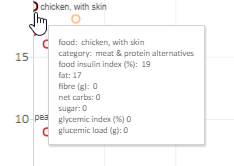
Why did chicken with skin have a higher insulin index than chicken without skin ?
Wouldn’t more fat calories lower the insulin index ?
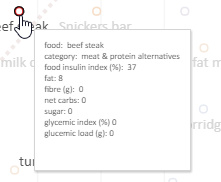
Why isn’t protein listed in this popup ?
Especially when it’s in the insulin load calculation.
![]()
For clarity,
Can you put
![]()
Food Insulin Index (FII) (%) in the Y axis ?
You use FII in the tabs to save space

But there is lots of room on the Y-axis to make things clear for newbies 
Marty, I like your lists …
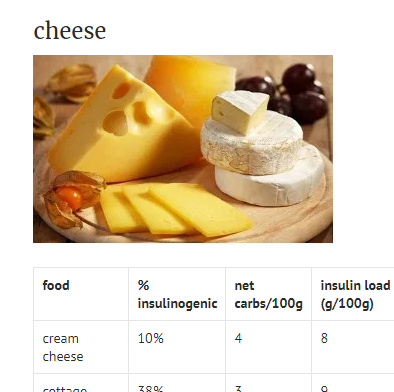
But why does cheese get a net carbs count and the vegetables do not ?
I think the takeaway from Dr Fung is not that it is OK to eat carbs, rather the goal is to minimize the insulin response of your diet. This involves understanding how high protein foods also impact your level of insulin and that the Glycemic Index is a best only an imperfect proxy for the impact of your individual food choices on your insulin response.
Furthermore, your insulin response is impacted not only by what you eat, but also by when you eat.
If your personal goals include maintaining yourself in a perpetual state of nutritional ketosis, and improving your insulin sensitivity, then just understand why we have an Insulin Index in addition to the Glycemic Index will help you achieve both of those goals even if the tabulation of the insulin response for individual foods is far from perfect.
Carbs - a large insulin response.
Proteins - a more moderate insulin response ( not to be ignored )
Fats - the lowest insulin response.
I think it is great to approach each article with a health measure of critical skepticism, but every study has flaws and those flaws should not preclude learning those rare gems of truth that can be extracted from what has been written.
Regards,
Richard
Wow thanks for your critique, I had just found this paper but admittedly went straight to the table and started to study the data. Terrible. How did it even get published? Sad from an A-grade university.
The other issue I have with it is that they used KCal of food as the ‘dose’. It would be helpful if they used serving size (I rarely say that because I like to compare using percentages) but with hormone response it would be nice to know how much a coffee with cream will raise my insulin and for how long for example, not how many Kcal of coffee with cream.
“The Ketogenic diet is a good diet, but not because it is Ketogenic” - Dr. Ron Rosedale. 
Hi @trjonas,
There’s a big point missing in this observation:
“To my surprise, things like bran cereal, porridge, and brown pasta are lower on the insulin index than beef, fish, or cheese. (!) Apples have the same score as fish; oranges are just one point higher.”
The counter-regulatory glucacon response is much more significant in foods like beef, fish, or cheese. This means that despite the similar insulin response, these foods remain ketogenic given the lack of blood sugar spikes, increased SNS activation that releases free fatty acids ready to be turned into ketones
You can take a deeper dive into how this happens with our post here https://nutrita.app/insulin-index/
Hi Edoos,
Interesting! Thanks for the note and the link to the informative post - I signed up to test drive Nutrita’s alpha version, too.
Tiffany
I wonder why they don’t have a Glucagon, IGF-1 balance index to tell you how that Glucagon and IGF-1 will contrast with that Insulin Index?
No balance?
E.g. Keeping glucagon high constantly is going to promote high blood sugars; in for example a diabetic?
Why it will not work to show any long-term health benefits?
For example:
3 different types of carbohydrates (glycemic index)
Several different types of dietary fats (SNP polymorphism reference?)
Different types of protein (e.g. cycling protein)
So how does a person compare or distinguish that to being fully fat adapted to partially using ketones and glucose for energy/fuel and they are not losing any body fat?
What about calorimetric measurements on the impact of ALL your hormones???
Having the kind of index I am talking about would probably resolve 95% of the problem?

